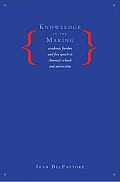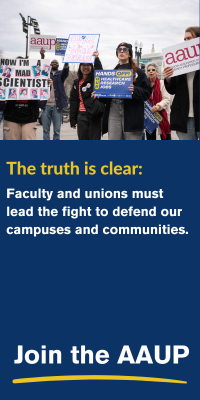- About
- Programs
- Issues
- Academic Freedom
- Political Attacks on Higher Education
- Resources on Collective Bargaining
- Shared Governance
- Campus Protests
- Faculty Compensation
- Racial Justice
- Diversity in Higher Ed
- Financial Crisis
- Privatization and OPMs
- Contingent Faculty Positions
- Tenure
- Workplace Issues
- Gender and Sexuality in Higher Ed
- Targeted Harassment
- Intellectual Property & Copyright
- Civility
- The Family and Medical Leave Act
- Pregnancy in the Academy
- Publications
- Data
- News
- Membership
- Chapters
Academic Freedom In Contentious Practice
Knowledge In The Making: Academic Freedom And Free Speech in America's Schools And Universities. Joan DelFattore. New Haven, CT: Yale University Press, 2010.
“Since freedom of mind and freedom of expression are the root of all freedom,” John Dewey wrote, “to deny freedom in education is a crime against democracy.” Clearly, the argument over the societal value of academic freedom in American education, especially in publicly funded education, is not new. And, at first glance, one might see yet another volume on the subject as taking a tired boot to a long-dead horse. But, as Joan DelFattore makes clear in her new book, Knowledge in the Making: Academic Freedom and Free Speech in America’s Schools and Universities, perhaps we in academia need reminding of the fundamental role academic freedom plays within our society. Given the current attacks on tenure and academic freedom that are gaining momentum throughout the country, DelFattore’s book comes at a critical time. In addition to its timeliness, Knowledge in the Making is an enjoyable read. DelFattore achieves a balance between making a philosophical argument for academic freedom and providing a practical tour of the present legal landscape for academic freedom in the United States.
DelFattore divides the book into nine chapters that investigate a wide range of topics, including homosexuality in the curriculum, the teaching of evolution, race-based theories of intelligence, and the regulation of hate speech. A central theme, one that will undoubtedly be most unnerving to professors and K–12 teachers, is just how little protection academic freedom has under our courts’ interpretations of US law—a reality that, as DelFattore points out, is often obscured by the institutional traditions in which academic freedom is a shared value of faculty and administration. The rise of neoliberalism and the corporate model of higher education, however, have increasingly threatened traditional models of shared governance, tenure, and academic freedom.
In her first few chapters, DelFattore makes the case for the critical role of academic freedom in our society and reviews the history of academic freedom and the efforts of organizations such as the AAUP to advance and defend it; she also deals with issues such as the protection of racist speech and race-based intelligence research. Even when she turns to specialized legal aspects of academic freedom, DelFattore presents her subject in a clear manner. She makes a concerted effort to make her book accessible to both higher education faculty members and K–12 educators. Having recently watched K–12 union leaders struggle on national television when faced with the question of why the public should continue to support tenure (without even uttering the words “academic freedom” or “democracy”), I hope that this book will make it into K–12 teachers’ lounges. K–12 teachers and university professors alike need to renew their commitment to educating the public about why academic freedom is fundamental to democracy and, in turn, why tenure is equally fundamental to protecting academic freedom.
In chapter 4, DelFattore outlines the way academic freedom becomes a factor in disputes relating to sexual orientation. Chapter 5 focuses on the rights of K–12 and university students whose personal beliefs conflict with those espoused in their classes. Evolution, creationism, and creationism’s newest incarnation, intelligent design, are the key topics of chapter 6, in which DelFattore explains the risk and reward of defending academic freedom for those who profess unpopular or improbable theories. David Horowitz and his so-called Academic Bill of Rights are considered in chapter 7. In the final two chapters, DelFattore deals with the US Supreme Court’s 2006 decision in Garcetti v. Ceballos and the post-Garcetti decisions that are central to the current legal arguments over free speech for public employees.
It should by now be clear to educators at all levels that the central purposes of education in the US have been transformed over the past century and, at a quickening pace, over the past thirty years. A key aspect of this transformation has been an intense devaluing of these purposes within institutions of education at all levels. Shared governance has given way to corporate and authoritarian systems of management. The protection of dissent and diversity of ideas provided by tenure are being replaced by the vulnerability of a “flexible” academic workforce on short-term, renewable contracts. Standards-driven, accreditation-imposed “realignment” schemes are moving curricular decision making from academic experts to management experts. At stake in these transformations is academic freedom; without it, true democratic education does not exist.
In Knowledge in the Making, Joan DelFattore provides both an appeal to urgency in repelling these attacks and a clear description of the legal obstacles and barriers that need to be overcome. The book is well worth reading.
John M. Elmore is associate professor of professional education in the College of Education at West Chester University of Pennsylvania. He is the author of the forthcoming Authoritarian Education in a Democratic Society. His e-mail address is [email protected].




